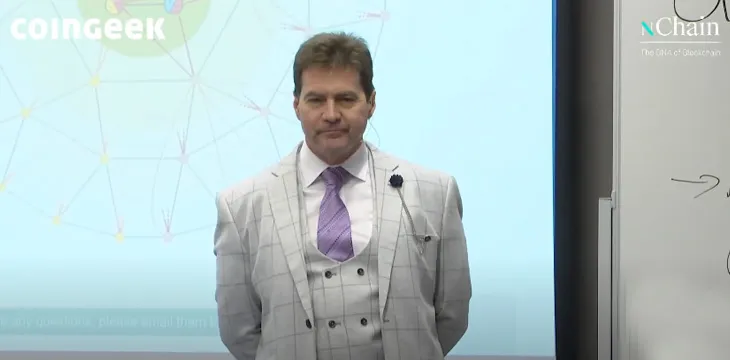|
Getting your Trinity Audio player ready...
|
Could you use IPv6 multicast addresses and the Bitcoin blockchain to build better social networks? Most certainly. In fact, we could remodel the entire internet this way and make sure creative developers get paid, not Silicon Valley giants. Dr. Craig Wright shares some suggestions in the third session of The Bitcoin Masterclasses Series 2, held last week in Ljubljana, Slovenia.
The third session is available to watch here, and the entire two-day event is available for viewing on the CoinGeek YouTube channel.
Bitcoin (and the Internet) should be peer-to-peer
“Here’s this wonderful peer-to-peer thing. Not the crap, modified, mangled, eaten by a cow and then shat out version of peer-to-peer that we call Bitcoin BTC (it’s not really Bitcoin).”
Dr. Wright gives the hypothetical example of a messaging network using Layered Multicast addresses. It’s a peer-to-peer network where only those who are online can see the messages, or search them. As long as a single member of the network stays online, the messages exist, but if everyone leaves then they disappear.
But you might want to have a searchable record of those messages. So there’s an incentive for someone to make sure they stay online, keeping that record alive. This model can apply to all kinds of data distribution, e.g., anything on the internet. It doesn’t have to be text messages, it could be web pages, different forms of media, financial records, Internet of Things (IoT) networks.
He compares this to a RAID (redundant array of inexpensive drives) array of hard drives. RAID uses multiple physical disks where data is distributed across the array according to different layout schemes. RAID also has numbered levels for data depending on the desired goal, e.g., reliability, availability, performance, and capacity. Data redundancy is a feature at levels where the information is more important, so if one drive fails the same data is still available on another one.
For blockchain data, this begins to create new economic opportunities and specializations. “Imagine now if we had a micropayment system. Imagine if, for a thousandth of a cent per slice, someone could request (that information) from you. Sounds boring—you only get a thousandth of a cent. But what if a million people access it a day? What if it happens every day, 24/7? What if it’s a billion people?”
Like RAID layers, you could provide services based on certain types of data and requirements. Levels of redundancy, file types, access speed. Using encryption and keys, you could determine data access levels. It would be peer-to-peer networks consisting of millions of small companies, all getting paid—instead of one big Google (NASDAQ: GOOGL).
The internet was originally supposed to work on these principles. Instead, we got giant service-provider companies that hoovered up everyone’s information to their own centralized data farms, where they mine that data for (their own) commercial advantage or act as powerful gatekeepers.
Twitter can sell the data from your posts for revenue… and they can send it to the NSA for surveillance. You are the product. This isn’t the case with blockchain-based P2P networks.
“And you wonder why Jack Dorsey is suing me!” Dr. Wright says.
Creative developers could create lucrative services from anywhere in the world. Rather than seeing all tech revenue channeled into Silicon Valley giants (and all the consequences of that) we could share that revenue around to thousands of smaller-but-better services, less intrusion into our privacy, less centralized control over our access to information.
“We want to bring back markets. Do that, each of you should be owning your own data.”
Better still, IPv6’s massive unique address availability makes it less susceptible to sniffing attacks—you’d have to install monitoring malware on every computer on Earth to know what’s available. If not, no external parties need even know your multicast network exist.
Does all this sound attractive? Most of these services don’t exist yet, so here’s your chance to build them. For inspiration on finding great opportunities, it’s definitely worthwhile to watch Dr. Wright’s The Bitcoin Masterclasses series in full.
Watch: Highlights from The Bitcoin Masterclasses 1 on Identity & Privacy

 07-14-2025
07-14-2025 





